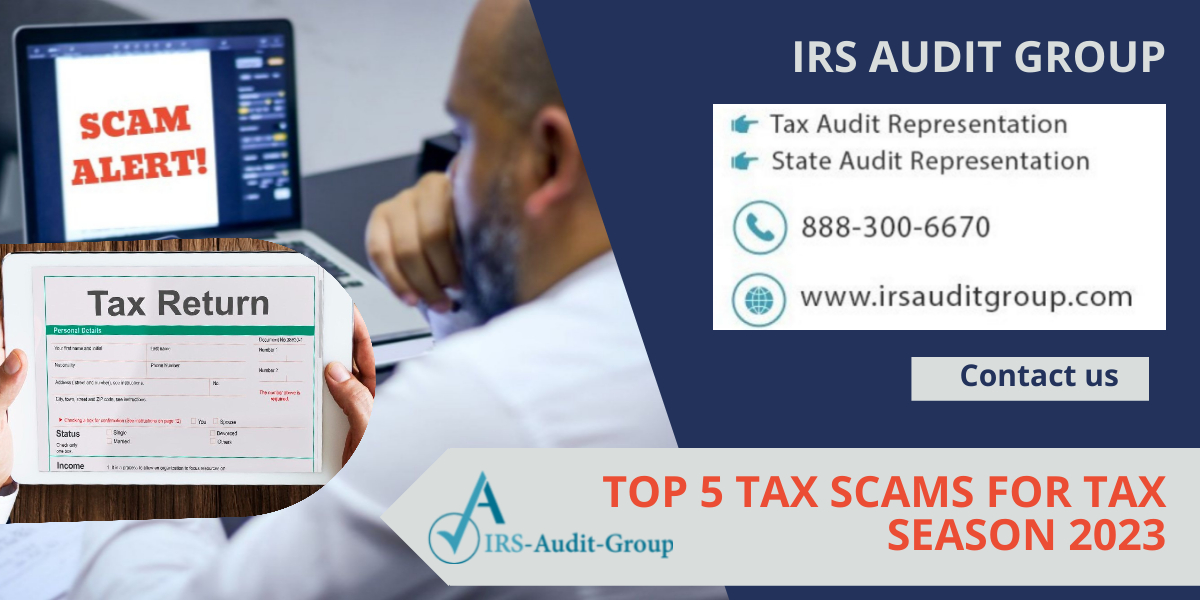Tax season 2023 has officially started and along comes an increased risk of falling victim to tax scams. These scams involve fraudsters who use a variety of tactics to impersonate the Internal Revenue System (IRS) and trick individuals into giving up their personal information or money.
Common Tax Scams
IRS letter Scam: Scammers send letters or notices that look like official IRS communication. These letters may demand immediate payment for unpaid taxes, jeopardize legal action or request personal information such as social security numbers or bank details.
Tax Transcript Scam: Fraudsters are sending fake email communications about tax transcripts claiming to be from “IRS Online”. A tax transcript is a summary of your tax records and history. IRS will never send such confidential information over email. IRS warns taxpayers not to open these emails as they contain malware that infects their devices to extract sensitive information like Social Security Numbers, Bank Account Details, and Passwords.
Ghost Tax Preparers: Ghost tax preparers are individuals who prepare tax returns but do not sign such documents. Unreliable ghost preparers frequently print the return, have the taxpayer sign it, and send it to the IRS. The ghost will prepare e-filed returns, but they refuse to digitally sign as the paid preparer. But IRS makes it mandatory for tax preparers to provide a digital signature and PTIN at the end of the tax filing form. Thus, taxpayers avoid such ghost preparers as they can file false information claiming to get more refund simply to satisfy you of their services.
Natural Disaster Relief: Natural disaster fraud is the deliberate use of deception to trick people and the government for personal gain. Natural disaster fraud comes in many forms including price gouging, insurance fraud, and forgery/impersonation. These scammers reach out to victims via phone, mail, or social media offering to help in relief funds in exchange for personal information.
IRS Telephone Scams: Scammers impersonate IRS agents and make unsolicited phone calls to individuals demanding immediate payment for unpaid taxes. They use tactics to make the call seem more legitimate such as spoofing the caller ID to make it appear that the call is from IRS. The IRS will never call the taxpayers demanding money in any form to pay them immediately. IRS will usually send a letter by mail informing about any tax owed or any IRS Audit to be done. IRS will always provide the opportunity to taxpayers for questioning or appealing on the tax owed. IRS will also never ask for debit or credit card details over the phone and will not threaten to bring local police or law enforcement agents.
What to do When You Encounter Such Scams?
- Do not provide any personal and financial information if received an unsolicited mail, call, or text message requesting payment.
- Verify the legitimacy of the request by contacting IRS directly at the phone number listed on the official website to verify the authenticity of the request.
- Visit the identity protection page if clicked on links in a suspicious email or website and entered confidential information.
- Report the W2 variant to the IRS – if a victim or not – and should also report any BEC/BES variants to the Internet Crime Complaint Center.
- Contact the Treasury Inspector General for Tax Administration (TIGTA) if an IRS imposter has contacted you. Report IRS imposter scams online by calling TIGTA at 1-800-366-4484. Forward email messages that claim to be from the IRS to phishing@irs.gov.
- File a complaint with the Federal Trade Commission (FTC) via their online complaint form and Federal Communications Commission (FCC) by visiting the Consumer Complaint Centre.
How to Avoid Such Scams?
Be aware of unsolicited communications, IRS will not initiate contact with taxpayers via email, text, or social media. Use a secure method to submit tax returns such as an authorized tax preparer, IRS e-file, or a secure mailbox. Do not send tax returns or payments via email. Stay up to date on the latest scams and fraud tactics by regularly checking the IRS website, news, and other resources. Installing call-blocking software for smartphones will avoid unwanted phone calls. Work with a reputable tax preparer who is properly licensed and registered with IRS. The IRS is aware of these scams and provides guidance on how to avoid and identify them. By taking these steps taxpayers can protect themselves from IRS scams and other types of fraudulent activity.
IRS Audit Group is a team of tax professionals, CPAs, Enrolled Agents, and Tax Attorneys, specializing in IRS Tax Audit Representation. We will file a power of attorney and contact the IRS or state agency to represent our clients. We will ease your stress-out IRS audit with our expertise in seamlessly resolving your case with IRS. Contact us for a free consultation to understand your tax situation. https://irsauditgroup.com/contact/
Telephone Number: (310) 498-7508
info@irs-audit-group.com

